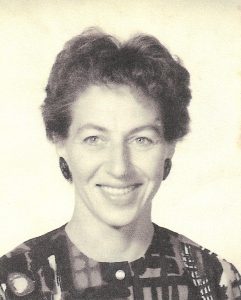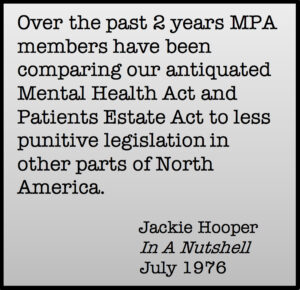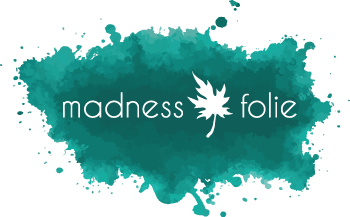Jackie Hooper

Born in 1927 and raised in Vancouver’s West End, Jackie Hooper was a middle-aged and divorced mother of two young boys when she joined MPA. She held bachelor degrees in library science and economics from the University of British Columbia (UBC), had worked as a surveyor in the mid-1950s, and as head librarian with the Greater Vancouver Regional District Planning Department for nearly a decade. In addition, Jackie was a keen writer and an accomplished landscape and portrait artist. Around 1970, however, Jackie’s life spun out of control.
From the beginning of MPA, decisions over employment were made by elections held at general membership meetings. The waged work that Jackie undertook during her years at the organization illustrates complex and key aspects of work at MPA. Like many other members voted into MPA paid positions, Jackie brought to her work skills acquired through education and previous employment. But at MPA, Jackie’s identity and expertise as a user of mental health services was also regarded as important, overlapping with an emerging set of credentials as an advocate and activist. Over the 1970s she wrote for and edited the Nutshell, worked as MPA office coordinator, was an MPA liaison with the provincial government, and initiated innovative supportive apartment housing projects at both Coast Mental Health and MPA.
MPA provided Jackie with a new stability and a context for advocacy. As early as August 1973 she was part of the MPA group meeting with NDP Minister of Human Resources Norm Levi to develop programs to support newly discharged Riverview patients. Jackie’s strengths as a policy negotiator are evident in documents from the late 1970s when she was central to funding discussions with the provincial government. Not long thereafter she was voted in as an office manager, basically running the MPA with three other office managers.
 During her time at MPA, Jackie’s interests centered on patient rights and the question of housing for individuals with psychiatric histories. One tactic that she frequently employed to position the mental health consumer as a specialist in finding solutions. Her 1976 piece, “Citizen Advocacy and MPA,” is a nuanced argument for a mental health ombudsman in BC, with a skilfully inserted suggestion that MPA was well positioned to take on this role. “Too Much Abuse,” written later the same year, presents tales brought to MPA of ill treatment at local mental health institutions and calls for a “full and immediate” probe of all incidents, with MPA members on the investigation committee.
During her time at MPA, Jackie’s interests centered on patient rights and the question of housing for individuals with psychiatric histories. One tactic that she frequently employed to position the mental health consumer as a specialist in finding solutions. Her 1976 piece, “Citizen Advocacy and MPA,” is a nuanced argument for a mental health ombudsman in BC, with a skilfully inserted suggestion that MPA was well positioned to take on this role. “Too Much Abuse,” written later the same year, presents tales brought to MPA of ill treatment at local mental health institutions and calls for a “full and immediate” probe of all incidents, with MPA members on the investigation committee.
Dave Beamish was probably thinking about Jackie when he shared this insight about the early MPA: “In those days [at MPA] there were a lot of people that were really quite qualified to do things. It’s just that they were in a bad spot [health wise] and they hadn’t been able to find anywhere else to go … some of the people were really talented and really exceptional, you know. People with degrees and all kinds of stuff that were going there because there was nowhere else to go.” Jackie’s academic training was helpful, not just in negotiating with the provincial government, but in her work at the Nutshell. In the September 1973 issue, for example, she reviewed Phil Brown’s edited collection, Radical Psychology, Radical Psychology, making easy work of translating the complex ideas of Laing, Marx and others into accessible language for a broad MPA readership.
When the organizational structure became much more bureaucratic as a result of shifting funding arrangements in the mid-1970s, Jackie decided to leave, “a lot of us quit at that time.” Jackie eventually became a professional social worker and an ardent and life-long housing advocate, yet her years at MPA were fundamental to the way her career unfolded, consolidating her identity as a consumer, patient advocate and mental health expert, both within the MPA orbit and in larger policy circles. In 1983 she completed a Masters in Social Work. In 1984 she graduated with a Masters in Social Work. Her Master’s thesis titled “Chronic Mental Patients in Three-Quarter Way Housing: Effect on the Quality of Life”, included a detailed review of available services in Vancouver. These services included those of Coast and MPA and the community care teams, social supports Jackie had helped to create. She then worked until retirement in 1992 as part of the Grandview Woodlands community mental health team.
We met Jackie in 2010 and she became a valuable colleague on the MPA documentary project, famously agreeing to be re-interviewed on four separate occasions. In the spring of 2014 Jackie received Coast Foundation’s Courage to Come Back Award as recognition for her personal resilience and valuable work creating supportive housing options for people with lived experience of mental health.
